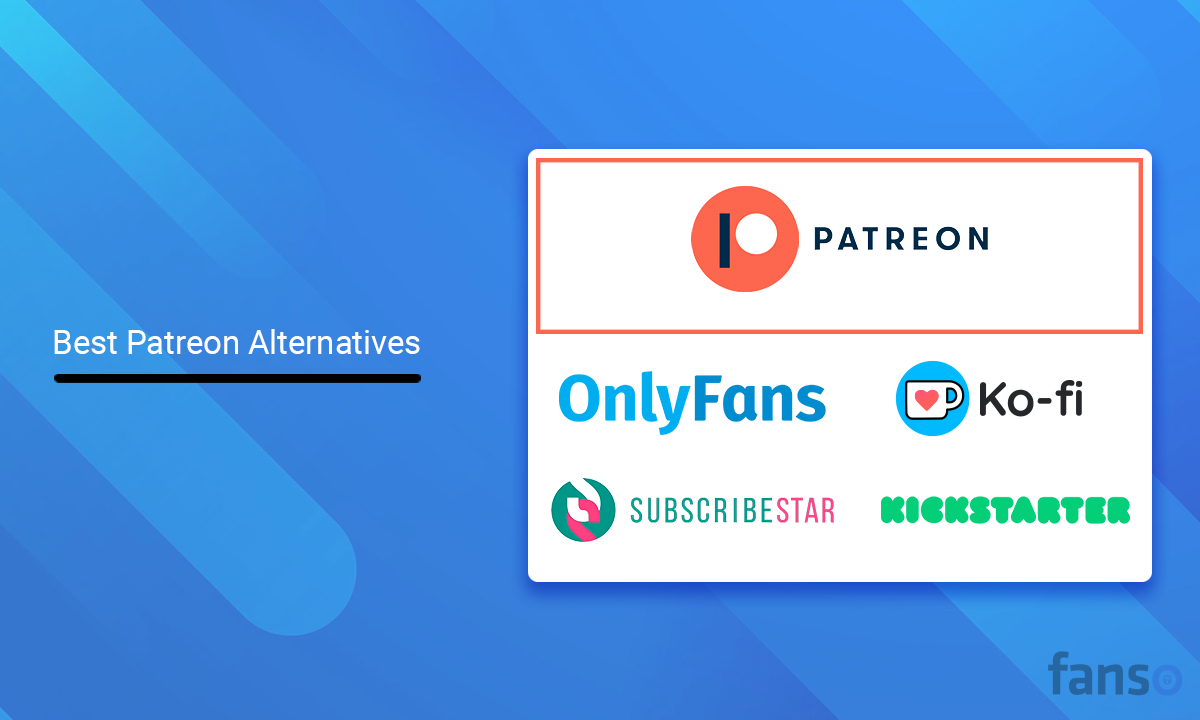Are you looking for Patreon alternatives or alternatives to Patreon?
Patreon is a platform that’s most useful during the time when you are making the leap from content creation as a side gig to a full-time job.
The platform is great for creators who want to launch a personalized subscription-based website, offer exclusive subscription content, and make a consistent monthly income.
Yes, Patreon can be a solid solution to start monetizing, as it takes almost no time to set up your creator page, and the platform feeds only kick in once you start generating more revenue.
But Patreon isn’t the only platform, and it won’t suit everyone.
So, let’s look into the list of best Patreon alternatives that give creators better monetization opportunities and more exposure to their brand.
5 Best Patreon Alternatives
Patreon was one of the leading platforms for creators to receive support from their fans through subscription-based memberships. However, there may be new or emerging alternatives; let’s look at 5 best Patreon alternatives:
1. OnlyFans
OnlyFans is a popular alternative to Patreon and has several similar features and functionalities. While it has a reputation for adult content, it is leveraged by content creators of all types to monetize with subscriptions, pay-per-view content, selling DMs, tips, etc. Like Patreon, OnlyFans also allows creators to set subscription tiers and offer different perks for each level.
| OnlyFans | Patreon |
| Originally designed for adult content creators, OnlyFans has expanded to include various types of content, such as fitness, cooking, art, and more. | Patreon is a more diverse platform catering to a wide range of creators, including artists, musicians, writers, podcasters, and more. |
| A subscription-based model where fans pay a monthly fee to access exclusive content from creators. | Creators on Patreon can offer both subscription-based models (monthly pledges) and one-time payments for specific projects or content releases. |
| Mainly relies on direct payments from subscribers to creators. The platform takes a percentage of the earnings. | Offers various payment options, including monthly subscriptions, one-time payments, and even per-creation pledges. Patreon also takes a percentage of the earnings. |
2. SubscribeStar
SubscribeStar is a subscription-based membership website, which is one of the and allows monetizing content by putting it behind a paywall. SubscribeStar is popular for being independent of published content.
Besides offering exclusive quality content, the platform also helps in community building. SubscribeStar includes messaging and other integrations like an analytics section where users can check the number of earnings collected per tier, profit charts and sources, and membership activity.
Creators can set up monetary goals and get your members to help achieve them. It enables the CAPTCHA test and two-factor authentication to protect the pages from bots.
| Subscribe Star | Patreon |
| Subscribe Star tends to have a more lenient content policy, allowing a wider range of content. | Patreon has specific content guidelines, and it has been known to take action against creators whose content violates these guidelines. |
| SubscribeStar offers low commission than Patreon. | Patreon has a tiered fee structure. The percentage taken by Patreon depends on the creator’s earnings and the benefits they want. |
3. KickStarter
KickStarter is another Patreon alternative, a crowdfunding platform where creators can set up campaigns as one-time projects and make money from them.
Creators can introduce products, create a funding goal, setting a time frame to fulfill the goal. Supports can donate money and make your dream project a reality.
KickStarter has an active and vast user base, making it easy for you to reach out to your supporters. It also has categories like film, technology, art, craft etc.
Creators can reward their supporters with personalized merchandise or early bird product access.
| KickStarter | Patreon |
| One time raising funds | Periodic and repetitive fundraising |
| After the fund goal is reached or when the campaign is completed, creators will be paid out | Fixed monthly payouts. |
| Deducts a 5% commission fee plus a 3 to 5% transaction fee | 5%-12% of the total amount earned plus a transaction fee of 3 to 5% |
| Suitable for one-off fundraising goals or new projects | Suited for creators with long-term goals. |
4. Ko-Fi
Another Patreon-like site is Ko-fi, which is a platform that helps creators accept donations from their audience to fund their projects while letting them build a basic eCommerce store.
Ko-fi is a platform that allows creators to receive support and contributions from their fans, followers, or supporters in the form of a virtual “coffee.” The platform is designed to help creators monetize their content and connect with their audience in a direct and simple way.
Users can buy a virtual coffee for a creator, which is essentially a way to make a one-time payment or donation. It’s a way for supporters to show appreciation for the creator’s work. Creators can showcase their work, whether it’s art, writing, videos, or any other creative content, in a gallery on their Ko-fi page.
| Ko-Fi | Patreon |
| Ko-fi is designed around the concept of “buying a coffee” for a creator. | Patreon is built around a subscription-based model, where fans can support creators on a monthly basis |
| Ko-fi doesn’t have a subscription model. Creators receive support through one-time payments. | Creators can set up different reward tiers for their subscribers, offering various benefits based on the level of support. |
| Ko-fi has a straightforward interface, making it easy for creators to set up and for supporters to make payments. | Patreon has a complex interface that requires a bit of work for users to figure out things. |
5. Building your own Patreon-like website
Now comes the most recommended and the best alternative to selling content on Patreon. Rather than joining on Patreon or other alternative platforms, build an Patreon-like website to sell your own content and invite other models to sell theirs. You can make money from subscriptions. If you sell exclusive content, you can earn from commissions from the revenue generated by other models on your platform.
But what is the easiest way to build a subscription website? Use a ready-made Patreon clone script by Fanso to create and launch your subscription site most efficiently, saving you valuable time, money, and effort. Just like when creating a website from scratch, you can customize your Patreon-like website the way you want.
Fanso is a white-label solution that comes with a one-time fee and allows you to build your fan club platform with subscriptions, live streaming, pay-per-view revenue method, secure payment gateways, and more.
Conclusion
Ultimately, the choice of a Patreon alternative depends on factors such as the type of content you create, the size of your audience, and your preferred payment model. Before making a decision, carefully evaluate the pros and cons of each platform, and consider experimenting with a few to see which resonates best with your audience. Remember that the key to success lies in the platform itself and your ability to engage and nurture your community.


